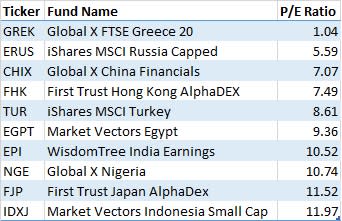The Cheapest ETF In The World
The Greek market is on sale, and I’m not talking about buying islands.
For the past three years, all of the news coming out of Greece has been negative. First, there were rumors of insolvency, then we had austerity and eventually intervention. Somewhere in between those stories we had riots, protests and political infighting. Things got so bad that the country’s largest corporation—a local bottling arm of Coca-Cola, Coca-Cola HBC AG—announced it was leaving the country without looking back.
And yet, despite all of this negativity, and the stubbornly high rate of unemployment still plaguing the country, Greek shares have been slowly recovering. The Global X FTSE Greece 20 (GREK | F-61) is up more than 20 percent YTD, and if you’re a traditional value investor, that could prove to be just the beginning.
Based on our in-house data, the trailing price-earnings ratio on GREK is just 1. In other words, you’re paying just $1 for every single dollar in earnings the 20 companies in GREK brought in over the past 12 months. And that figure is not some quirk of the companies in the fund or the selection process. The MSCI Greece Investable Markets index has a P/E of just 2.5. That’s significantly higher than GREK’s portfolio, but still drastically cheaper than any other single country currently covered by an ETF.
To illustrate just how absurd that figure is, take a look at the 10 cheapest single-country ETFs in our system. Of course, a P/E ratio is only applicable to equity ETFs. Commodities, fixed-income (corporate or otherwise) and currency ETFs don't hold companies, and therefore don't have underlying earnings. The cheapest ETF — as measured by P/E — must therefore be an equity ETF.

Compared with that list, GREK sticks out like a sore thumb. No matter how much trouble Russia seems to be in economically (and politically, for that matter) its market is still priced at 5 times trailing earnings, or 500 percent higher than GREK. Even if you think Greek companies will struggle in the coming months and years, surely there’s a case to be made for buying Greek earnings for 104 cents on the dollar.
Typically when a market or stock is as cheap as GREK, the shares have been sold in anticipation of a bankruptcy or massive earnings miss. After all, trailing earnings tell us little about the future. In the case of GREK, that conclusion is not that straightforward.
As we pointed out earlier, GREK is up more than 20 percent YTD and by more than 30 percent over the past year. In fact, since its inception in December 2011, GREK is up roughly 60 percent. The fund’s depressed P/E therefore can’t be blamed on a massive sell-off in Greek shares.
It could be that the market expects a massive decline in earnings over the coming months and years. They would not be out of line in their thinking, as the Greek economy is still quite a mess. On the other hand, it could be the market has still vastly undervalued the Greek stock market and the recent gains will persist.
A quick glance at the only global value funds shows just one that includes Greece—the iShares MSCI EAFE Value (EFV | B-91)—and it only gives Greece an 8 bp weighting in its portfolio. That could change, as Greece has been reclassified by most index providers, including MSCI, as an emerging market. It might be that Greek companies will find their way into the iShares MSCI Emerging Markets Value (EVAL | C-95), but even that is no guarantee.
As such, value investors who believe the Greek market is woefully mispriced would have to buy GREK to take advantage. It’s certainly not for the faint of heart, but it is sitting there in the bargain bin waiting for someone to take notice.
At the time this article was written, the author held no positions in the securities mentioned. Contact Paul Baiocchi at pbaiocchi@indexuniverse.com.
